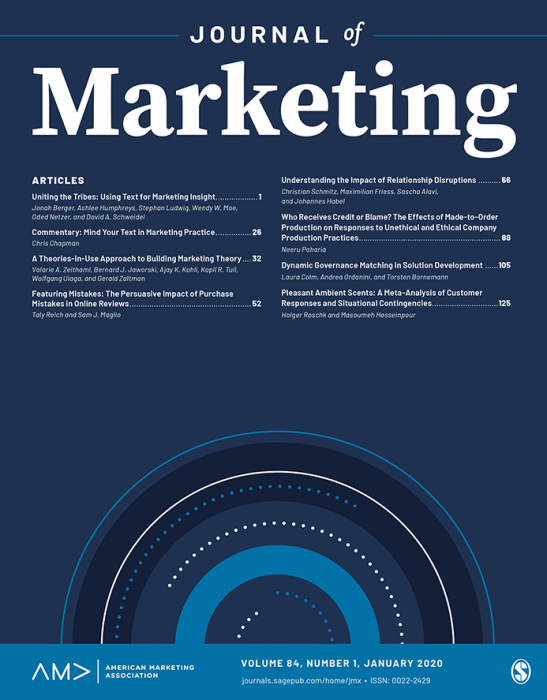EXPRESS: Psychological Ownership and Territorial Behaviors in Rental Transactions: Why “Who” You Rent from Matters
IF 10.4
1区 管理学
Q1 BUSINESS
引用次数: 0
Abstract
The phenomenal growth in rentals, with the advent of access-based platforms, has made it possible for consumers to rent products from person providers (e.g., Alex on Airbnb) and company providers (e.g., Apex Vacations on Airbnb). But does “who” a consumer rents from matter? Across nine experiments (including one with real behaviors), we demonstrate that despite the product being the same, consumers differ in how they feel about the product depending on “who” they are renting from. Consumers feel stronger psychological ownership for the product when renting from company providers than person providers. These feelings of psychological ownership drive consumers to engage in “territorial” behaviors – actions that assert their claim on the rented product (租赁交易中的心理所有权和地域行为:为什么你从“谁”那里租房很重要
随着基于访问的平台的出现,租赁业务的显著增长使得消费者可以从个人供应商(例如Airbnb上的Alex)和公司供应商(例如Airbnb上的Apex Vacations)那里租赁产品。但消费者从“谁”那里租东西重要吗?通过九个实验(包括一个真实的行为),我们证明了尽管产品是相同的,但消费者对产品的感受取决于他们从“谁”那里租来的。与个人租赁相比,消费者从公司租赁时对产品的心理所有权更强。这种心理上的所有权感驱使消费者进行“领土”行为——即对租赁产品主张所有权的行为(例如,在租赁小屋中移动家具)。因此,消费者在向公司租赁时比向个人租赁时更愿意表现出这种行为。这些行为通过增加运营负担和财产损失给租赁供应商带来了实际成本,这可以通过对Airbnb社区平台上供应商评论的额外分析和对供应商的采访来证明。我们进一步确定策略,通过改变消费者的心理所有权感受,通过其在租赁环境中的前因:供应商与租赁产品的联系,来减轻消费者的领土行为。
本文章由计算机程序翻译,如有差异,请以英文原文为准。
求助全文
约1分钟内获得全文
求助全文
来源期刊

Journal of Marketing
BUSINESS-
CiteScore
24.10
自引率
5.40%
发文量
49
期刊介绍:
Founded in 1936,the Journal of Marketing (JM) serves as a premier outlet for substantive research in marketing. JM is dedicated to developing and disseminating knowledge about real-world marketing questions, catering to scholars, educators, managers, policy makers, consumers, and other global societal stakeholders. Over the years,JM has played a crucial role in shaping the content and boundaries of the marketing discipline.
 求助内容:
求助内容: 应助结果提醒方式:
应助结果提醒方式:


